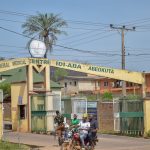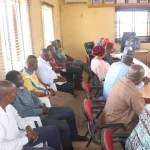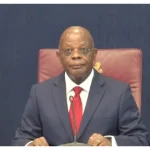...To get all news updates, Join our WhatsApp Group (Click Here)
Also Join our WhatsApp Channel (Click Here)
Some Nigerians in Finland are in panic following the arrest and detention of separatist leader, Simon Ekpa.
Ekpa is one of the leaders of the outlawed Indigenous People of Biafra.
According to sources, Nigerians in the European country are afraid of commenting on the arrest of the suspect over fear of being attacked.
A Nigerian community leader, who spoke to one of our correspondents on condition of anonymity for fear of victimisation, noted that the Igbo community was “gravely affected” by the violent acts of the secessionist group.
He said, “Everyone is afraid to speak about Ekpa’s arrest. The key people in Finland and the Igbo community at large are not ready to lend their voices either.”
The source noted that some persons were being accused of reporting Ekpa to the police and were being threatened.
“A particular person they accused now, they’re after him. This happened before he (Ekpa) was even remanded—what will happen when they imprison him? Everyone is afraid. These people are very deadly,” the source said.
Another resident, who also asked not to be identified, said there was tension among Nigerians in the country.
“People don’t want to speak about Ekpa for fear of being hunted by his followers. We believe that they will hunt whoever comes out to talk about their leader. But the Finnish Government is trying to get rid of the situation.”
Ekpa’s arrest
Ekpa was arrested alongside four others on Thursday by Finnish authorities on suspicion of terror-related activities, including incitement to violence and financing terrorism.
Checks revealed that his X handle (@simon_ekpa) had been inactive for four days.
Ekpa, who describes himself as the Prime Minister of the Biafra Republic Government-in-Exile, is accused of using social media to promote violent activities in southeastern Nigeria, including attacks on civilians and the authorities.
He was first arrested in February 2023 for inciting comments and sit-at-home orders to the people of the South-East.
The suspect gained international notoriety for his calls to boycott Nigeria’s 2023 general elections, which were enforced through violent means, contributing to attacks on residents.
Before his arrest, Ekpa had attracted global attention, with thousands of Nigerians worldwide petitioning the Finnish and Nigerian governments, as well as the European Union, to take action against his disruptive activities.
In response, the Nigerian Ministry of Foreign Affairs summoned the Finnish Ambassador to Nigeria, Leena Pylvanainen, urging Finland to cooperate in addressing Ekpa’s threats.
A local publication in Finland, Yle noted that the Finnish National Bureau of Investigation acted on the reports by detaining Ekpa and later releasing him.
The Finnish police also confirmed that Ekpa, a Finnish citizen of Nigerian origin, and four of his accomplices were arrested as part of an international investigation.
A report stated that the District Court of Päijät-Häme, Finland, ordered Ekpa’s remand in prison, “with probable cause on suspicion of public incitement to commit a crime with terrorist intent.”
The police stated that the main suspect, Ekpa, was arrested “on suspicion of public incitement to commit a crime with terrorist intent,” while four unnamed accomplices were arrested “for financing a terrorist crime.”
A Senior Detective Superintendent at Finland’s National Bureau of Investigation, Mikko Laaksonen, confirmed via email to Saturday PUNCH that further details about the suspects couldn’t be disclosed.
Laaksonen explained that “NBI Finland cannot confirm the name of the suspect(s). The proceedings in the district court and contents of the decisions are classified at this point of the investigation,” adding, “The Ministry of Justice is the competent authority regarding extraditions.”
Hunt for sponsors
Meanwhile, Nigerians on social media have begun to search for suspected sponsors of the suspect, particularly those financing his alleged terror activities from the United States.
An X user, @Burmese_Tyga_, stated that those sponsoring him should be identified and brought to book.
He said, “If Simon Ekpa is indicted for terrorism in Finland and you know anybody in the US who has donated to him, pls forward name and address to me. I’ll make a comprehensive list I’m sending to the Department of State as sponsors of terrorism.
Someone has to pay for the lives wasted and blood spilled in Igbo land. Destroying your lives here in the US is the least we can do.”
Several names were thrown up under the tweet, as some of those identified denied having any relationship with him.
But a user, @MaaziFaisal, said the Finnish Government might check his financial flow.
“And those in Diaspora and at home funding his terrorism act will be brought to book,” he added.
Detention excites IPOB, MASSOB indifferent
The spokesman for IPOB, Emma Powerful, said people in the South-East were happy with the arrest of the suspect, adding that he had been responsible for the many travails in the region.
He said, “There was no rest; people could not sleep with two eyes closed, people cannot go to another village for visitation because of what he is doing with his criminal gang.
“Except the politicians that are supporting him that will not be happy with what is happening to him. Now he has said that he is not a prime minister of Biafra and that he is an ordinary member. He is not our member.
“If they (government) feel that they can extradite him, better. If they feel like bringing him for trial in Nigeria, it is okay. But they know those sponsoring him.”
But the spokesperson for the Movement for the Actualisation of the Sovereign State of Biafra, Samuel Edeson, said the group had commenced consultation on Ekpa’s arrest.
Edeson said, “We are still studying the events and circumstances surrounding the arrest. We will consult other groups and do the needful when we are done.”
Nigeria monitors situation
The Ministry of Foreign Affairs said the Nigerian government would continue to track the progress of Ekpa’s case, emphasising the importance of addressing the influence of IPOB and transnational actors on the country’s national security.
The spokesperson for the ministry, Kimiebi Ebienfa, in a statement on Friday, confirmed the arrest of Ekpa on Thursday.
“He was charged with inciting terrorism and promoting violence. The Finnish District Court of Päijät-Häme ruled to detain him on probable cause for publicly inciting crimes with terrorist intent.
“The ministry wishes to affirm that the arrest of Mr Simon Ekpa is a significant development in addressing the activities of IPOB and neutralising the influence of transnational actors on our national security. The ministry will continue to monitor the legal proceedings and provide further updates as the case progresses,” the statement said.
Extradition process
The Director of Defence Information, Brigadier General Tukur Gusau, on Thursday, suggested that Ekpa, who is the leader of the Eastern Security Network, the paramilitary wing of the Indigenous People of Biafra, would be extradited to Nigeria to face criminal charges.
However, experts have expressed concerns about the challenges involved in the process, highlighting significant legal and diplomatic hurdles.
Some argue that Finland and Nigeria do not have an extradition treaty, which may create a problem for Ekpa to face charges for the alleged crime in Nigeria.
However, a former Nigerian envoy, Ambassador Yemi Farounbi, in an interview with Saturday PUNCH, said the decision to extradite would ultimately depend on the nature of the diplomatic relationship between the two countries.
He said even in the absence of a direct extradition treaty, multilateral agreements could play a role.
“It is possible that countries may extradite individuals based on multilateral agreements, even if there is no direct treaty between them,” he added.
He also highlighted the role of international law, noting that as a sovereign nation, Nigeria’s interests would be protected under the United Nations framework.
“No member of the United Nations would support actions that threaten the sovereignty of another member nation unless there is a direct bilateral dispute,” Farounbi added.
The ex-envoy also emphasised that Finland would follow due process and the rule of law in any extradition decision, and that the court’s ruling would be based on Finland’s legal framework, not Nigeria’s.
“If Simon Ekpa’s actions are deemed to threaten Finland’s diplomatic interests, the court could rule against extradition based on Finnish law,” he said.
You can get every of our news as soon as they drop on WhatsApp ...To get all news updates, Join our WhatsApp Group (Click Here)
Also Join our WhatsApp Channel (Click Here)
















